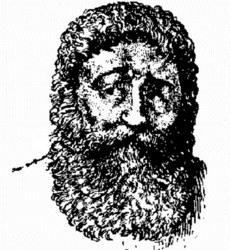The humours (2)
Galen (a Roman physician of the second century, A.D.) was the authority cited by those who followed traditional medical practice. In his Art of Physic, translated in Shakespeare's lifetime, the man of "choleric complexion [physical and mental make-up]" was described thus:
We call that man choleric in whose body heat and dryness abounds. . . Such persons are usually short of stature, and not fat. . . their skin rough and hot in feeling, and their bodies very hairy; the hair of their heads is yellowish, red or flaxen; the colour of their face is tawny or sunburnt; they have beards; they have little hollow hazel eyes. . . their concoction [digestion] is very strong; their pulse is swift and strong, their urine yellow and thin; they dream of fighting, quarrelling, fire, and burning*.
Ben Jonson's sense of humour?*
Footnotes
-
Dreaming of war
Hotspur's wife tells us that he has precisely the dreams of the choleric man (and gives us at the same time a lesson in the vocabulary of period warfare):
"In thy faint slumbers I by thee have watched,
And heard thee murmur tales of iron wars,
Speak terms of manage to thy bounding steed,
Cry 'Courage! To the field!' And thou hast talked
Of sallies and retires, of trenches, tents,
Of palisadoes, frontiers, parapets,
Of basilisks, of cannon, culverin,
Of prisoners' ransom, and of soldiers slain,
And all the currents of a heady fight."
(Henry IV, Part One, 2.3.47-55) -
Choleric characters
"As for conditions [personality], they are naturally quick witted, bold, no way shame-faced, furious, hasty, quarrel-some, fraudulent, eloquent, courageous, stout-hearted creatures, not given to sleep much, but much given to jesting, mocking and lying."
(Notice how a clinical description of body-type and urine is combined with a description of personality traits. In the integrated universe of the Renaissance physiology and psychology were not separated.)
This description of the choleric personality fits some of Shakespeare's fiery characters (Hotspur comes to mind). Macbeth could perhaps be seen as choleric-melancholic, alternating rapidly between extremes. The categories may seem crude and arbitrary, but we might ask how our systems for describing personality will look in a hundred years: introvert/extrovert (compare melancholic/sanguine) manic-depressive (choleric/melancholic) and so on.
-
Ben Jonson and humour characters
Ben Jonson started a fashion in comic characters with one quality of personality exaggerated above all others--"humorous" characters.
